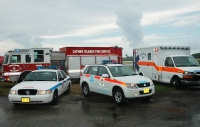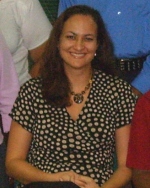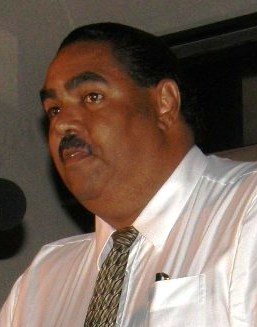Archive for August 26th, 2009

Emergency response to improve with new technology
 (CNS): Cayman’s emergency services vehicle system has arrived in the 21st Century with the installation of Global Positioning System (GPS) technology in the first responder units, allowing operators to keep track of ambulances, fire trucks and police cars to help them direct response to 911 calls more efficiently. The system has been widely welcome among all the emergency service providers.
(CNS): Cayman’s emergency services vehicle system has arrived in the 21st Century with the installation of Global Positioning System (GPS) technology in the first responder units, allowing operators to keep track of ambulances, fire trucks and police cars to help them direct response to 911 calls more efficiently. The system has been widely welcome among all the emergency service providers.
It is currently installed in 42 vehicles on Grand Cayman, with preparations underway for eight more.
“The Global Positioning System (GPS) technology installed in the first responder units now allow 911 operators to dispatch officers and medics with the benefit of knowing where they are prior to dispatch, saving valuable seconds in an emergency,” said Assistant Deputy Chief Secretary Eric Bush.
He said that unit performance is being monitored and evaluated, with positive results thus far. “In an emergency, time is of the essence. A faster response can mean the difference between life and death. Having this technology is significant because it will allow the police and fire departments to bring the situation under control quicker; and the ambulance to response faster, thereby giving patients a better chance – which in some cases can save lives.” he added.
The Portfolio of Internal and External Affairs contracted local company Sat-Trak to provide the equipment and one year’s worth of data. The contract can be extended thereafter. While Sat-Trak offers technical support, the system is managed by government employees.
The decision to utilise this technology follows last year’s evaluation of electronic tracking devices in local vehicles. The system uses a high-tech combination of GPS, satellite map overlays, the tracking of vehicle movements and the transmission of key information every 30 seconds or every 100 meters.
Lands and Survey’s Geographic Information System is also utilised, with the map system providing on-screen display of house numbers and other information relevant to emergency telecommunicators and first-responders.
Hal Ebanks, the EMS acting manager, welcomed this development. “Sat-Trak will be beneficial as it provides paramedics in the responding units with up-to-the-minute information regarding the location of an incident. This can be vital, as every moment counts during an emergency. Another key feature is that the fleet management and maintenance information can be utilized to project vehicle usage and life-span based on the data collected.”
Information is transmitted from vehicles to the 911 centre using cellular technology. The 911 system dispatches all emergency vehicles. Emergency Communications Manager Brent Finster said that the primary advantage of the system’s capability its that it allows staff who are monitoring the vehicles on computer screens to dispatch the closest appropriate vehicle to the specific emergency situation and to monitor the response.
Police Commissioner David Baines said the RCIPS also embraces this new service. “This equipment will enable the RCIPS to get to emergencies sooner, identify the nearest patrol and deploy those assets to best effect. This will help us be on scene to help our communities faster – and that has to be good!”
The system retains historical data for a period of time, facilitating useful historical references. Printed reports are also possible. Officials note that these features should also enhance Freedom of Information options, as well as meet possible legal requirements.
In addition to vehicle locations, Sat-Trak indicates whether or not a vehicle is running, and if it is moving it reports the route and speed. The system can also isolate a particular emergency service provider even when it is part of a group.
Further, as well as vehicle beacons, every emergency service using the system has in place a perimeter alert. This advises dispatchers every time vehicles enter or leave their respective compounds.

Prevention of gender discrimination moves slowly
 (CNS): Although the senior policy advisor for gender affairs, Tammy Ebanks-Bishop, says work to develop a gender training programme, public education tools and formulate policies for the Cayman Islands has been steadily progressing, the Cayman Islands has still not signed the Convention on the Elimination of Discrimination Against Women (CEDAW). And new legislation, promised almost a year ago, to protect women has not yet been put in place, though the minister with responsibility has stated she intends to bring the legislation before the end of 2009.
(CNS): Although the senior policy advisor for gender affairs, Tammy Ebanks-Bishop, says work to develop a gender training programme, public education tools and formulate policies for the Cayman Islands has been steadily progressing, the Cayman Islands has still not signed the Convention on the Elimination of Discrimination Against Women (CEDAW). And new legislation, promised almost a year ago, to protect women has not yet been put in place, though the minister with responsibility has stated she intends to bring the legislation before the end of 2009.
Minister responsible for Gender Affairs, Juliana O’Connor-Connolly, has stated that the ministry intends to bring the draft Prevention of Gender Discrimination Bill (2009) to the Legislative Assembly before the close of the year. This, she said, would enable CEDAW to be extended to the Cayman Islands.
O’Connor-Connolly also said that the ministry intends to move forward in the area of gender affairs by identifying three to four priority areas wherein specific gender training would be provided. “We will organise public education efforts and provide generalised gender awareness training and analysis of the policies, operations and programmes within our ministry,” she added.
“We expect that continued development of gender affairs for the Cayman Islands will lead to the establishment of a model Office of Gender Affairs, once the financial and human resources become available.”
Meanwhile, Ebanks-Bishop has been involved in an exchange in Trinidad and Tobago to view how that country is pursuing its gender affairs programme. The trip was entirely funded by the United Nations Population Fund (UNFPA) sub-regional office for the Caribbean.
Following Cabinet’s 2004 acceptance of a National Policy on Gender Equity and Equality, Ebanks-Bishop was appointed in September 2008 to provide analysis that would enhance gender mainstreaming efforts in policies and programmes. In addition, she was to review regional models and advise government on establishing a local Gender Affairs Office.
“This exchange gave me an opportunity to learn from a Caribbean country that the World Economic Forum rates among the top 20 countries world-wide for narrowing the gender gap. The visit was most beneficial as I was able to interact with staff at all levels and learn from their experiences in gender mainstreaming at the programming and policy level,” explained Ebanks-Bishop.
Posted in Trinidad and Tobago’s Gender Affairs Division, she said she was able to observe its day-to-day operations. "I was able to receive policy documents and training templates and visit community-based programmes geared at job-creation in non-traditional careers for women, gender training, and support for victims of domestic violence ,” she added.
Pensions boss to depart
(CNS): The Superintendent of Pensions at Cayman’s National Pensions Office, Cyril Theriault, is leaving on Friday, 28 August, and CNS understands that he has not yet been replaced. After more than five years, Theriault told CNS he felt it was time for him to concentrate on his grandchildren instead of the battle to make employers comply with the National Pensions Law. Theriault’s departure, however, comes at a time of uncertainty with two key board members also resigning and government announcing plans of a private pension contribution holiday to stimulate the economy.
Theriault confirmed that, aside from his own resignation from the superintendent’s job and consequently the board, both Phil Jackson and Brian Bothwell, the chair, had also resigned.
Talking about the recent proposals for a freeze, Theriault said he had not been widely consulted or briefed about government plans and was only really aware of what had been reported in the press. “I know only what I have read in the media and a brief exchange with the minister,” he said. “If this is to happen, however, there would need to be fundamental changes to the law. A holiday can’t happen as it stands now as that would be illegal.”
Leader of Government Business McKeeva Bush said on 10 August that he intended to explore the idea of a ‘pensions holiday’ for the private sector in order to stimulate the economy by giving both employers and employees money to spend. Bush has also set the wheels in motion for a freeze on civil service pensions, which is expected to actually cut the deficit government would face for 2009/10 financial year. While a private pension freeze won’t help government’s coffers directly, Bush said he hoped it would help people through a difficult time and maybe save some small businesses on the brink of going under.
However, Theriault questioned the wisdom of such a decision as he said 10% of people’s income was not a great deal of money, and the short time period muted between 6 months to a year was not necessarily enough to make a difference to the economy or save an ailing business — but enough to harm a pension fund. He also noted that the board had already publically stated that it was not in favour nor was the Pension Providers Association.
“What concerns me is that it is a short period and that 10% of wages is not a fortune,” he added. “I am not against it if it would do what they want it to do, if it would save people’s businesses — if it did it might be a goodthing — but I’m not sure it will make an impact. But I hope they accomplish what they want.”
He said that he understood it would be a voluntary decision but whether that meant on the part of just the employer or just the employee he was not sure.
Theriault noted, too, that in the face of the uncertainty surrounding the potential holiday there were other concerns that his office faced regarding compliance and collection. He said if there was a holiday, once the national pension was re-instated the office needed to be given more resources and more teeth in order to make people compliant, as well as a more accurate way of assessing the actual number of businesses in Cayman that had employees for whom pension contributions should be made. Asked what percentage of employers complied with the law Theriault said it was difficult to say as the office had never been able to establish exactly how many employers there are on the island.
Looking over his time in office, Theriault said that in short he had fought the same battle for the last five years, in which time nothing really had changed and the role was more akin to a collection agent than it was a pension superintendent.
If you like this article, click here to find out how to support CNS

Burns takes aim at auditor general
 (CNS): Local businessman and former George Town independent election candidate, BurnsConolly, says he has waited for almost four years to take some form of legal action over a report which he says damaged his business reputation. With the publication of the Public Accounts Committee’s findings on the special report by Auditor General Dan Duguay on the Royal Watler Cruise Terminal Capital Project due imminently, Conolly says he will finally be able to take up his case against the original report, which he has always insisted was erroneous and damaging towards the Burns Conolly Group.
(CNS): Local businessman and former George Town independent election candidate, BurnsConolly, says he has waited for almost four years to take some form of legal action over a report which he says damaged his business reputation. With the publication of the Public Accounts Committee’s findings on the special report by Auditor General Dan Duguay on the Royal Watler Cruise Terminal Capital Project due imminently, Conolly says he will finally be able to take up his case against the original report, which he has always insisted was erroneous and damaging towards the Burns Conolly Group.
“I have waited patiently as I did not want to corrupt the Public Accounts Committee process but once they have published their report on this then I will begin looking at proceedings against everyone who said that this report was correct,” the owner of the Burns Conolly Group, which was the project manager on the development, told CNS.
The local businessman announced on Cayman-Crosstalk, Rooster 101’s morning phone-in show, Tuesday when PAC chair Ezzard Miller made his weekly appearance, that he still intended to pursue legal action over what he described as the erroneous report. He said the report had been in the public domain since January 2006 without being corrected, but as soon as PAC had finished their part he would be free to press his case.
Speaking with CNS on Tuesday afternoon, Conolly said that the whole report had been a farce and had negatively impacted his business. “We did not get any new business for more than nine months after that report came out,” Conolly added. He said that the findings in the report were completely wrong and despite his submissions of some 800 pages of information to the PAC about why it was wrong, he said Duguay had made only the most insignificant changes to his report.
The fundamental findings Duguay made in his 2006 report were that the government could have saved more than $4 million if it had not bundled the tenders for the pier and the upland development together on the Royal Watler Port development.
Conolly insists that the development ended up being an entirely different project from that originally tendered and worth millions more than the original contract, and that it was one of the most cost effective projects which government had ever developed.
However, Duguay stands by his report as he says that ultimately his remit was to examine the details of the original tenders and he still questions why the two projects were bundled together and why the more expensive bids were picked. Despite the fact that change orders were made, he said the changes have little bearing on his report’s fundamental findings, which were, among others, that if government had picked one bid for the pier and another for the upland project it would have saved money.
“Ironically, we never really criticised Burns Conolly, who was the project manager,” Duguay noted, adding that the people who were criticised were on the Port Board and the director, who agreed with the office’s findings, although the report does talk about excessive overruns.
“Nobody has ever indicated where we were wrong with regards to the choice made in relation to the tender and I stand by the report. No matter what came after, no one has ever been able to answer why the tenders had to be consortiums for both projects and that two separate bids could not have been accepted, which would have been cheaper.”
Duguay admits his office did not have all of the details of the changes made post-bid, but when Conolly came to his office and they went through the report page by page,Duguay says he made many changes but most of the information was not relevant to his original findings, which he said were not fundamentally altered by it. “In terms of the original tender the best value for money bids were not chosen and no one has ever explained why,” Duguay added.
Conolly has always disputed the changes and says that Duguay did not take any of the information he had supplied on board and that the changes were typographical and not substantial. He also states that the report was never sent to him nor did the Auditor General’s Office ever ask the Burns Conolly Group to comment on it. Conolly says the Group became aware of this document several weeks after it had been distributed by the AG’s Office and received a copy from a third party.
In the report’s conclusion Duguay focuses mostly on the problems with the port management and states that the project was financially viable but was poorly planned and managed from the port’s perspective. “The procurement activities did not secure the best value for money and there is strong evidence of overcharges,” Duguay writes, adding that there were significant corporate governance issues, which needed to be addressed to ensure a proper planning and accountability for any future major capital projects.